Marchés
Lors de la conception d’une intervention humanitaire et de la prise de décisions quant à l’utilisation des transferts monétaires, l’analyse générale des options de réponse doit inclure une analyse de marché. Il est prouvé qu’offrir un soutien ciblant le fonctionnement des marchés accélère la reprise et accroît la résilience dans les zones affectées par une catastrophe.
De nombreuses organisations ont investi dans la mise au point d’outils visant à faciliter l’analyse de marché et réfléchissent à la mise en place de programmes basés sur les marchés plus holistiques. Elles envisagent des interventions tirant profit du marché (basées notamment sur des transferts monétaires aux populations affectées), ainsi que des interventions soutenant directement les marchés (comme l’octroi de subventions conditionnelles aux vendeurs/euses pour la remise en condition du marché).
Initiatives associées
Contenu associé

1.2 Introduction à l’analyse de marché
Cours
Ce cours de 30 minutes offre une introduction à l’analyse de marché pour les contextes d’urgence. Il contient des contributions d'experts dans ce domaine. Ce cours a été développé en collaboration avec l'International Rescue Committee et le CALP Network et grâce au financement d’USAID/OFDA et de l’Agence Suisse pour le Développement et la Coopération. Il est destiné aux...

2.4 Un guide pratique pour l’analyse de marché
Cours
Ce cours en ligne de 3.5 heures vise à fournir aux équipes qui conduiront des analyses de marchés en contextes humanitaires une compréhension approfondie de la théorie et des étapes à suivre afin de leur permettre de comprendre le pourquoi et le comment du processus à suivre. Les participants seront guides à travers un scenario d'analyse de marchés d'urgence. Ce cours s'appuie sur...
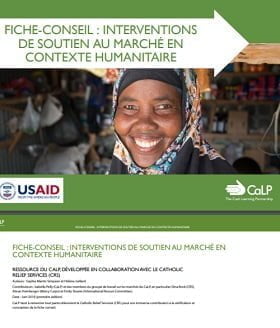
Fiche-Conseil : Interventions de soutien au marché en contexte humanitaire
Guides et outils
La fiche conseil définit le programme de soutien au marché en contexte humanitaire et le décrit dans la pratique. Elle permet aux praticiens humanitaires d’envisager systématiquement des interventions de soutien au marché, parallèlement à d’autres activités du programme. Le champ d’application comprend des interventions de soutien au marché axées sur l’offre/la disponibilité...
Thematic lead
Latest

Case Study of the Poultry and Grape/Raisin subsectors in Afghanistan: Guided case study in value chain development for conflict-affected environments
Report
Is the value chain approach effective for restoring market-based economic activity in a severely affected post-conflict environment?. The goal of this study is to gather empirical evidence to answer this question, looking at the role of the value chain approach in the work of USAID’s Rebuilding...

Evaluation of Concern Kenya’s Kerio Valley Cash Transfer Pilot (KVCTP)
Report
The Kerio Valley Cash Transfer Pilot (KVCTP) was Concern and its local partner the Catholic Diocese of Eldoret’s short-term and targeted response to the food security problems that affected communities in four Sub-locations in Baringo North and Pokot East Districts as a result of the post election...

Market Development in Crisis Affected Environments: Emerging lessons for achieving pro-poor economic reconstruction
Report
This paper documents practitioner experience and innovations in market development for income generation and livelihood security in crisis and post-crisis settings. War and natural disaster have devastating impacts on people’s ability to generate income and secure a sustainable livelihood that can...

Direct Cash Transfer to Post Election Violence affected Host Population: Nakuru, South Rift Valley, Kenya. Internal Evaluation
Report
Post-election violence in Kenya started in late December 2007 and led to a large-scale destruction of property, disruption of transportation and labour markets, and displacement of an estimated 250.000 to 300.000 people throughout the country. Homes and shops were burnt or looted; farms were affected as...

Market Assessment and Analysis: Learner’s notes
Guidelines and Tools
This document presents the “Learner’s Notes” that accompany a distance learning course on Market Assessment and Analysis. The course illustrates how markets operate and how they relate to and affect food security and vulnerable households. It describes market components and how they function...

Lignes directrices sur les programmes de transferts monétaires
Guides et outils
Un guide pratique, qui comprend aussi les fiches d’orientation et une section sur les outils pratiques. S’appuyant sur le large éventail d’expériences en transferts monétaires au sein du Mouvement de la Croix Rouge et du Croissant Rouge, et dans le secteur humanitaire en général, ces directives...

Practitioners’ Guide to the Household Economy Approach
Guidelines and Tools
This guide is aimed at those carrying out household economy approach (HEA) assessments, and is intended to serve as both a refresher guide for experienced practitioners and a set of reference reading materials to accompany formal trainings for new practitioners. The Practitioners’ Guide is presented as...
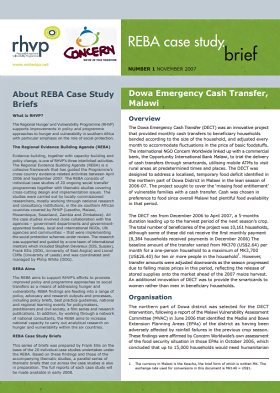
Dowa emergency cash transfer, Malawi
Case Study
This case study looks at the innovative Concern Worldwide project which provided monthly cash transfers to beneficiary households using smartcards utilising mobile ATMs to deliver the cash. The report examines the choice of programme delivery mechanism, the targeting of beneficiaries, coordination, cost...
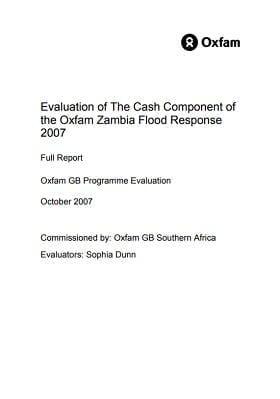
Evaluation of The Cash Component of the Oxfam Zambia Flood Response 2007
Report
Oxfam Zambia responded to the flooding in Western Province by providing unconditional cash grants to 2100 households over a four month period (May – August 2007) in two wards of Mongu District Ushaa and Lumbo. The grant was designed to prevent malnutrition and harmful levels of asset depletion and...
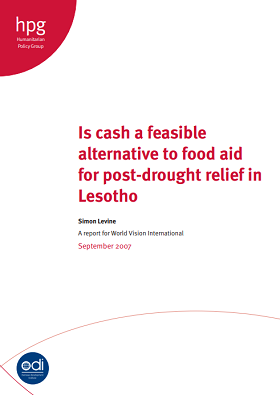
Is cash a feasible alternative to food aid for post-drought relief in Lesotho
Case Study
This report summarises the findings from a study undertaken to assess whether or not a cash based response by World Vision to the current drought in Lesotho would be an appropriate and feasible response. It looks at the potential problems which could affect the feasibility of cash interventions and...
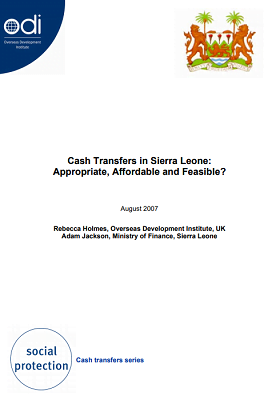
Cash transfers in Sierra Leone: Appropriate, affordable and feasible?
Case Study
This paper is one of a series of outputs from ODI’s research study (2006–09) “Cash Transfers and their Role in Social Protection”. The study aims to compare cash with other forms of transfers, identifying where cash transfers may be preferable, the preconditions for cash transfers to work well,...
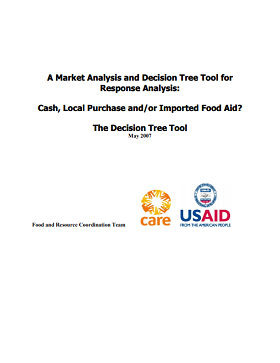
A Market Analysis and Decision Tree Tool for Response Analysis: Cash, Local Purchase and/or Imported Food Aid?
Report
This document provides the Decision Tree Tool, which is to be used for the analysis of response options in a food insecurity context – cash, local purchase or imported food aid (see MIFRA paper). The framework is kept simple for ease of communication with a sequence of specific questions divided into 2...
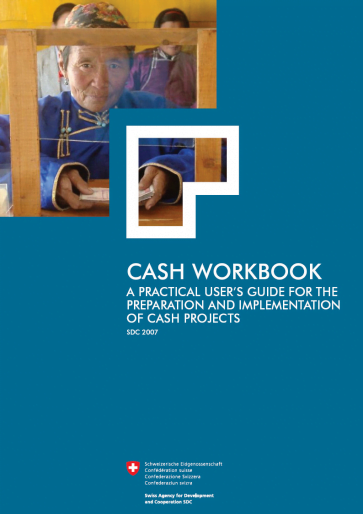
Cash Workbook: A Practical User’s Guide for the Preparation and Implementation of Cash Projects
Guidelines and Tools
This workbook is a tool that guides managers through the project cycle of managing a cash transfer programme including administrative and database setup, and project management systems and procedures.

External Evaluation Report on the Cash for Repair and Reconstruction Project Sri Lanka
Report
The Indian Ocean tsunami caused huge loss of life, displacement and destruction in Sri Lanka. People’s immediate priorities were to find shelter, safety, meet basic needs and trace and mourn loved ones. The population affected took shelter with relatives and friends, in temples, mosques and public...
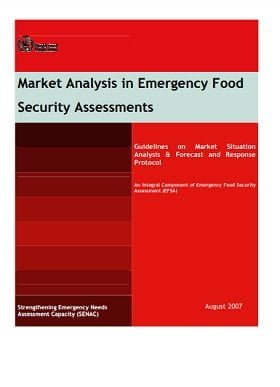
Market Analysis in Emergency Food Security Assessments
Guidelines and Tools
This document provides a generic overview of market analysis as an integral part of an emergency food security assessment. The main objective is to provide a basic understanding of markets, including how to gather market information, conduct a situation analysis, and
interpret the analysis to inform...

Cash Workbook – A Practical User’s Guide for the Preparation and Implementation of Cash Projects
Report
Since 1999, the Humanitarian Aid Department of the Swiss Agency for Development and Cooperation (SDC), a division of the Federal Department of Foreign Affairs, has implemented a series of Cash Transfer Projects in different humanitarian contexts. Cash grants provided to more than 100,000 people in need...
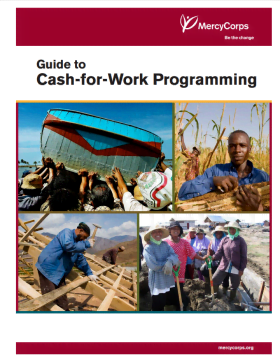
Guide to Cash-for-Work Programming
Guidelines and Tools
Cash-for-Work is a short-term intervention used by humanitarian assistance organizations to provide temporary employment in public projects (such as repairing roads, clearing debris or re-building infrastructure) to the most vulnerable segments of a population. The methodology is relatively new, but its...

Market Analysis Tools in Rapid-Onset Emergencies: Phase one report
Report
This report was commissioned by Oxfam’s Emergency Food Security and Livelihood (EFSL) team as part of a larger exercise to develop a market analysis toolkit for rapid-onset emergency situations. The impetus for this arose from the recognition by Oxfam, other humanitarian agencies and donors that the...

The Use of Cash/Vouchers in Response to Vulnerability and Food Insecurity: Case study review and analysis
Report
This document summarizes the major characteristics and outcomes of 27 recent pilots, projects or programs worldwide that made use of cash and/or vouchers to provide benefits to people in need. The concluding section attempts to synthesize the commonalities and contrasts among those cases, as a first step...
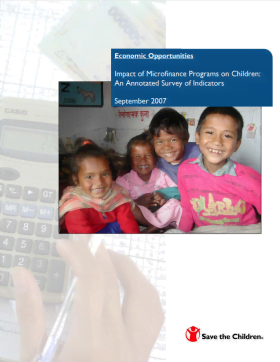
Impact of Microfinance Programs on Children: An annotated survey of indicators
Report
The purpose of this study is to ascertain what indicators have been used by multisectoral, child-focused non-governmental organizations (NGOs), microfinance practitioners and social performance researchers to assess processes that address children’s concerns in operations and the impact of microfinance...



